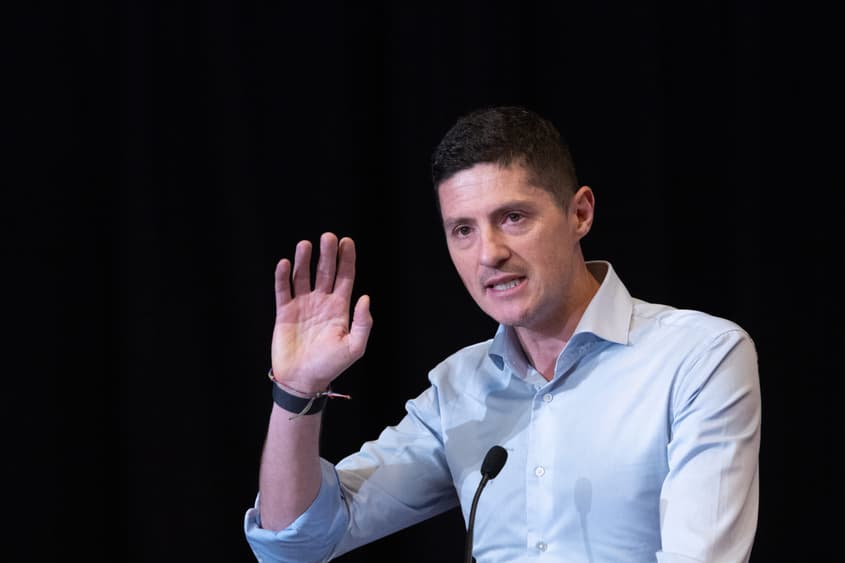ACTU calls for a 25% tax on gas exports to help fix Australia's housing problem
Thu 30 Oct 2025 09.00

Photo: Mike Bowers
Australians are being ripped off.
That’s the blunt message delivered by the Australian Council of Trade Unions (ACTU) at the Australia Institute’s Revenue Summit in Canberra.
Ripped off specifically by the gas industry, and “it’s been an open secret for years”, said Assistant Secretary Liam O’Brien.
“The Petroleum Resource Rent Tax (PRRT) is a rort on the Australian people.
“The gas industry is corrupting our politics and hurting our budget, not to mention the impact that it has on our climate.”
The PRRT is a federal tax on the profits gas and oil companies make from extracting petroleum resources – mainly in offshore gas and oil projects.
“It is literally the price they pay for the product they sell.”
Mr O’Brien said, “a full two thirds of all projects that should be eligible have never paid a cent in PRRT, and that includes all of our major gas exports.
“The rate of tax that we do collect from the PRRT, it’s laughable … it’s riddled with loopholes.”
“For every $100 of gas that we export, we collect about $0.43, not $43 but 43 cents.”
The ACTU has long campaigned for the “broken” tax to be scrapped, with Mr O’Brien commending Treasurer Jim Chalmers for “bravely” opening it up for review in 2023. He said ultimately, “the industry pulled out all the stops to prevent serious reform”.
It’s a move backed by Greens leader, Senator Larissa Waters, who told the summit it was, “an elaborate con that gas companies are readily happy to game”.
As companies around the globe reap record profits from the global energy crisis, Mr O’Brien said they’re able to “wriggle out of their obligations” in Australia through loopholes.
He urged the Australian Government follow the lead of other leading gas exporting countries, such as Qatar and Norway.
“Norway taxes its petroleum exports at 56%, and that’s on top of its corporate tax rate.
“They use that revenue, as we all know, to amass the largest sovereign wealth fund in the world, a gargantuan $1.8 trillion that used to underwrite social services, health care, renewable energy, education across the country.”
The ACTU is proposing the government introduce a new 25% levy on Australia’s gas exports, a move Mr O’Brien estimated would have raised $17.1 billion last year, still half of what Qatar brings in.
“In 2023, Qatar exported $83 billion worth of gas and collected $38 billion in export royalties. That same year, Australia exported 86 billion, slightly more worth of gas, but collected $1.9 billion from the PRRT.”
In his address to the Australia Institute’s Revenue Summit, the ACTU Assistant Secretary also took aim at the fuel-tax-credit scheme, calling it an “unjustifiable multi-billion dollar impost on the public”.
The scheme provides certain businesses with a credit for the fuel tax they pay on diesel, petrol, and other fuels used in off-road or heavy industrial activities.
Mr O’Brien argued it “undercuts major Commonwealth goals on climate, on budget, sustainability and on intergenerational equity”.
He said both schemes “rob the Australian public of tens of billions of dollars annually”.
Analysis by The Australia Institute shows the ACTU’s call for a 25% tax on revenue from gas exports would raise, on average, $12.5 billion annually, enough to triple the Australian Government’s housing expenditure.
It found the revenue would be enough to cut the cost of prescriptions, with a 58% increase to the pharmaceutical benefits scheme, double Australian Government spending on public schools or increase childcare subsidies by 75 per cent.
The Australia Institute’s co-chief executive Dr Richard Denniss told the summit, “The Australian Government collects more revenue from HECS than it does from the Petroleum Resource Rent Tax. Kids repaying the debt, are more of a backbone of our budget than the gas industry.”
Mr O’Brien pointed out Australians would be “taking back what is ours, all of the billions of dollars that disappear down the gurgler through the loopholes in the PRRT”.
“So maybe the CEOs won’t be able to afford that third vacation home, but thousands of young Australians will finally have a place of their own to call home.”
“When we think about solving some of the national crises that we could build an additional 50,000 social, affordable houses over five years with that sort of coin.”
Mr O’Brien emphasised the big oil and gas companies aren’t “about fairness or about ensuring Australian workers, consumers and businesses benefit from the abundance of resources we own.
“Moreover, they don’t act in the interests of the Australian public. That is, unless we make them.”